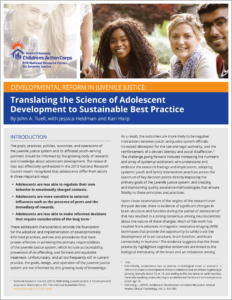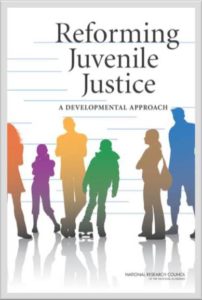A developmental approach to juvenile justice means embracing policies and practices at every decision point that are informed by an understanding of adolescent development and the effects of juvenile justice interventions. The RFK National Resource Center acknowledges and embraces this approach in all of our training, technical assistance, and consultation work.
For specific guidance on how to translate the science of adolescent development into policy and daily practice, please reference Developmental Reform in Juvenile Justice: Translating the Science of Adolescent Development to Sustainable Best Practice, available within our Online Resource Library.
 Developmental Reform in Juvenile Justice: Translating the Science of Adolescent Development to Sustainable Best Practice
Developmental Reform in Juvenile Justice: Translating the Science of Adolescent Development to Sustainable Best Practice
John A. Tuell, with Jessica Heldman and Kari Harp, Robert F. Kennedy Children’s Action Corps (2017)
This resource is written to support the continued transformation of our nation’s juvenile justice systems in a manner that adheres to its primary responsibilities while effectively incorporating the research-based knowledge about adolescent development into practice. This brief lays out a set of research-based best practices and approaches that are fundamental to a state or local jurisdiction’s efforts to maximize the likelihood for improved and sustainable youth outcomes and system performance consistent with the research on adolescent development.
As recognized in the 2013 National Research Council report, Reforming Juvenile Justice: A Developmental Approach, adolescents differ from adults in three important ways:
- Adolescents are less able to regulate their own behavior in emotionally charged contexts.
- Adolescents are more sensitive to external influences such as the presence of peers and the immediacy of rewards.
- Adolescents are less able to make informed decisions that require consideration of the long-term consequences.
The National Research Council report also noted that programs that aim to reduce risk factors associated with delinquency and violence by fostering prosocial development and by building protective factors at the individual, family, school, and peer levels have been shown to be successful at preventing adolescent re-offending.
The overarching goal of the juvenile justice system and its youth serving partners is to support the positive social development of youth who become involved in the system, thereby making communities safer. The specific aims are to hold youths accountable for wrongdoing, prevent further offending, and treat youth fairly. All three of these aims are compatible with a developmental approach to juvenile justice. Our work in the field relies on translating these important findings into principles that support effective and efficient juvenile justice system performance and achievement of positive youth and family outcomes.
 John Tuell, Executive Director of the RFK National Resource Center, was privileged to serve as a member of the subcommittee to create a Prioritized Plan to Implement a Developmental Approach in Juvenile Justice Reform (within the Committee on Law and Justice, Division of Behavioral and Social Sciences and Education of the National Academy of Sciences). The subcommittee members were contributing authors for the 2014 report Implementing Juvenile Justice Reform: The Federal Role, which identified seven hallmarks of a developmental approach to juvenile justice:
John Tuell, Executive Director of the RFK National Resource Center, was privileged to serve as a member of the subcommittee to create a Prioritized Plan to Implement a Developmental Approach in Juvenile Justice Reform (within the Committee on Law and Justice, Division of Behavioral and Social Sciences and Education of the National Academy of Sciences). The subcommittee members were contributing authors for the 2014 report Implementing Juvenile Justice Reform: The Federal Role, which identified seven hallmarks of a developmental approach to juvenile justice:
Accountability without criminalization: Adolescents need opportunities to accept responsibility for their actions and, where appropriate, to make amends to affected individuals and communities. However, given that adolescence is a transient period, when youth are involved in the justice system, measures should be taken to fully preserve the youth’s opportunities for successful integration into adult life.
Alternatives to justice system involvement: Interventions that aim to prevent re-offending often are more effective if services needed by adolescents are provided within the community and not through the justice system, as long as accountability is also achieved when appropriate. Well-designed community-based programs are more likely than institutional confinement to facilitate healthy development and reduce recidivism for the majority of youth who come to the attention of the juvenile justice system.
Individualized approach based on assessment of needs and risks: Individualized assessment of the treatment and intervention needs of the adolescent, as well as the risk of subsequent offending, helps to match needs appropriately to levels of supervision and services.
Confinement only when necessary for public safety: Even when youth are adjudicated as delinquent, alternatives to confinement often serve the goals of the system. This does not mean that all services need to be provided outside of residential placement, which is necessary for some adolescents from a public safety perspective. Studies have shown, however, that confinement of juveniles beyond the minimum amount needed to deliver intensive services effectively is not only wasteful economically but also potentially harmful, and it may impede prosocial development.
A genuine commitment to fairness: Treating youth fairly and ensuring that they perceive they have been treated fairly and with dignity contribute to several important features of prosocial development, including moral development, belief in the legitimacy of the law, and the legal socialization process generally.
Sensitivity to disparate treatment: As perceptions of unfairness have been corrosive to minorities, their families, and communities, jurisdictions’ efforts to reduce racial/ethnic disparities are extremely important and can ameliorate the effects of disadvantage and discrimination by reducing unnecessary involvement with and confinement in the justice system.
Family engagement: A positive family experience is a central feature of positive youth development, even for system-involved youth. The juvenile justice system has the opportunity and responsibility to encourage family involvement whenever possible, including interactions with law enforcement, court proceedings, service delivery, intervention, and reintegration, in order to produce successful outcomes and to reduce re-offending.
The RFK National Resource Center for Juvenile Justice staff and consultants use a range of methodologies within our training, technical assistance and consultation to support effective translation of these hallmarks into the following key policy and practice areas:
- Collaborative Leadership
- Structured Decision Making and Risks-Needs-Responsivity
- Alternative Response / Diversion
- Detention Alternatives
- Trauma Screening
- Positive Youth Justice
- Balance of Monitoring and Treatment
- Graduated Responses / Sanctions
- Family Engagement
